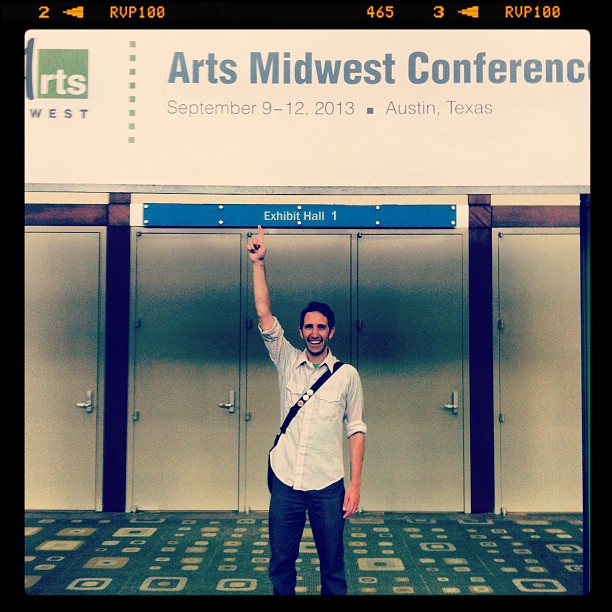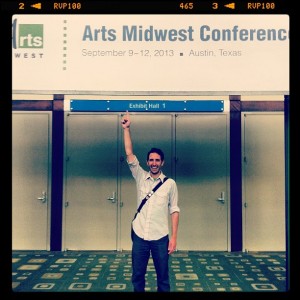A few of years ago I started to attend the various regional arts presenter conferences to sell my wares: um, that would be selling me. After touring a bit of the fringe circuit and self-producing my one-man shows I wanted to take the next step in my professional development and network with the gatekeepers of the performing arts industry. What I was about to embark on was incredibly strange, fulfilling, exhausting and necessary.
Let’s get one thing straight. Trying to make money as a performing artist can suck the life out of you. I’ve talked about the trial and error of self-producing at length. I got very quickly that donning on every administrative hat plus trying to write, rehearse and memorize my work was completely unsustainable. Shit, it still is. I’m actually doing the same amount of work after attending these conference for the past three years but I learned a deeply value lesson: Face time is everything.
I network with more people in four days at one of these conferences than I could in two years in any other capacity. I recently learned from an arts presenter that he gets over 400 emails a day sometimes. It doesn’t matter if you take a class in how to write the most catchy and intriguing subject line. Your personality, your essence, your friggin’ je ne sais quoi is not going to come through a flat screen. Presenters want to see you in action.
But action costs money.
Quite a bit. After doing a bunch of research and talking with artists I found out that trying to do APAP (Association of Arts Presenters) in NYC as my first conference would just overwhelm me. I’m glad I heeded their caution because it enabled me to not only save the $800-$1400 in attending plus showcasing, but also allowed me time to dig my heels into a regional where I could learn the ropes of this world under saner circumstances.
I really can’t say enough about Arts Midwest. Besides running a stellar conference, they are an incredible service organization that runs a tight ship. Questions are answered, myths are debunked, help is a phone call away. Seriously. Arts Midwest cost me about $550 for the exhibit booth. Showcasing outside of that ran me $300. Then I also had to get there, eat… y’know, live. It can easily run a grand per regional although APAP is much more expensive whereas Arts Northwest can often be the cheapest. The theory is that if you book one job it pays for the conference two times over.
After I spoke with multiple people I discovered that the rule of thumb was that Arts Midwest was the best regional, then WAA, then PAE. APAP was in a league of it’s own, being in NYC and having three festivals tied into it. Also there’s Arts Northwest which has a different pool of presenters which I’ll talk about below.
What’s a regional?
The big three regionals (Arts Midwest, WAA and PAE) focus on medium to large presenters within their territories. Some of these presenters also have multiple venues and spaces that they manage including black boxes. WAA (Western Arts Alliance) covers the west coast over into the rockies. Arts Midwest covers the midwest (duh) up into Canada and all the way down to Texas. PAE (Performing Arts Exchange) handles part of the mid-atlantic but is more concentrated on the deep south and southeast.
Arts Northwest deals primarily with smaller to medium size presenters. Their market includes Washington, Oregon, Alaska, British Columbia, Idaho and they are branching out into Utah and Montana. APAP covers NYC, New England for the most part but really serves the whole country and is international in scope. For example, one professional development panel at APAP I attended was about touring in Central Europe.
What the hell happens at these things?
Well, a lot does my friend. Luckily the conferences will set you up with a mentor who you talk to about a month before the conference to get a sense of how things work, gain some clarity into the uniqueness of the regional and prepare you for what is about to happen. My mentors from all the regionals have been invaluable resources to me. However nothing prepares you for the the exhibit hall or what some call “the pit”.
I used the phrase incredibly strange in the first paragraph of this post for good reason. These are trade shows. The exhibit hall is where booking agents, management companies, service organizations and self-managed artists set up booths with retractable banners, press kits and other marketing materials so that a passersby can take a look and see if they want to talk shop.
Hello, Can I Interest You in a Solo Show?
When I set up my first booth at Arts Midwest I took a look around and realized that I was now on the other side of something that I normally observed while smirking. Since I have a fascination with infomercials, trade shows are the natural equivalent to a continuous sales pitch. Luckily all of that initial weirdness was deflated when I attended the New Colleagues Orientation and met a bunch of people, including my mentor, who had been coming to this conference for a decade plus.
Everyone was super nice. This was the midwest after all, but it wasn’t for show. People were genuinely interested in what I did and were incredibly generous in sharing their knowledge and leading me in the direction of who to talk to. The exhibit hall became one of many places where I networked with presenters, agents, other artists and art supporters. I made a ton of connections and learned so much about the industry and the way it works.
Let’s all watch a show in 15 minutes!
Showcasing is a big part of these conferences and a lot of the time they take place in the hotel where the conference is located. I went in on an independent showcase with a bunch of other artists to make it cost effective and spent roughly $300 to showcase for 15 minutes. Think that’s expensive? I got quotes from $450-$1200 for 15 minutes. Sometimes agents will manage a showcase, buy a full night in one of the rooms, fill their artist in slots and sell the rest off. They have fancy lights, drink tickets, a buffet, all sorts of razzle dazzle to lure in people to watch. I decided to work with people who were all artists and just wanted to show their skills without the glitter balloons.
People came to the showcase and I was actually surprised because I was basically an unknown. It went well and I got some cards from people who were genuinely interested in hiring me to perform at their venue. One of those connections took three years to turn into a gig. I still check in with these presenters and wait for the timing to be right letting them know I’ll do whatever I can to make it easy for them.
You don’t have to showcase if you have a booth but you cannot showcase if you don’t have a booth. Make sense. Booth = Showcase opportunity. No booth = no showcase. If you are represented by an agency, however, then you can get a showcase because you are rep’d in the hall. Seems to me that if you’re going to spend all that time and energy getting to these conferences you should take full advantage of getting eyeballs especially because you never know who is going to walk into the room.
Artists have told me that they have 40 people in the room at their showcase and they don’t get any bites and the next year three people show up and they get two of those people to book them. You basically just have to show up and do it.
Look At You All Up in the Spotlight
Most of the conferences have special showcasing that is juried by a panel of presenters, artists and agents. Unlike the independent showcases mentioned above these showcases are in traditional venue close to the conference where everyone is bused in. 75% of conference attendees will be present to see you in action with professional lighting, sound, the works. The benefits of getting a spotlight/ juried showcase can’t be underestimated.
I’ve watched people with these showcases get solid bookings throughout the next two years. Again, there’s no guarantee but the advantages cannot be denied. These showcases are incredibly competitive. At this point I just recently found out I’m an alternate, meaning if someone drops their slot I can grab it but the odds of that happening are slim because these opportunities are not something easily passed up.
Showing Up is More Than Half of It
Speaking of showing up, that’s really the crux of all this. People want to know that you aren’t a fly by night operation, that you are in it for the long hall. If you show up to one conference and never return, presenters aren’t going to notice you’re missing. The more they see you, the more they trust that you are invested in your work as an artist.
There’s been times where I’ve run into the same person a few times at one conference and then see them a few months later at another one. Maybe I shot them an email about my showcase and they see me in person and say “Oh hey Seth, I got your email. I’m going to try my best to make your showcase.” That is gold. Even if it doesn’t lead to anything for while I am now a real person to them and not just another email in their inbox that they delete. Again, the face time is essential. It’s gigantic.
When I first started attending I asked all my mentors how long it took to get solid bookings and they all said the same thing: three to five years. Presenters are looking at this from the perspective of their audience base, board members and organizational sustainability. You are presenting a product (no matter how strange that seems at first) and they are figuring out whether they can sell it.
Think of it this way. If you go into a supermarket and see a brand of chips that looks interesting but you’ve never had them and don’t no one anyone else who has, you probably won’t try them right off the bat. However, every time you return to shop you may or may not see those chips but finally after enough trips take a chance on them. Those chances go up if someone else you trust says they’re good.
It’s weird, but it’s how we’re programmed and how this market operates.
How? What? Who? Next?
It’s tough to figure out the best way to check out and then decide to invest your time, energy and above all capital in a conference. One thing you can do is attend a conference as a delegate or a non-exhibitor. You just get a badge and go to everything: all the networking events, lunches, professional development panels, showcases. Hang out with people after hours at the bar. You don’t need to get an exhibit booth or showcase. You can just take it all in and see what you think.
You definitely want to be set up with a mentor so that you can ask questions and get your concerns dealt with. I think the best conferences to do this are either Arts Midwest or Arts Northwest depending on where you live. The vibe of both of these conference is open, friendly and courteous.
If you wonder if these conferences are for you I’m available for a consult to determine whether it’s a good step for you or not. Just contact me. They really aren’t for everyone for a variety of reasons but sometimes you need to ask more specific questions to make an informed decision.

